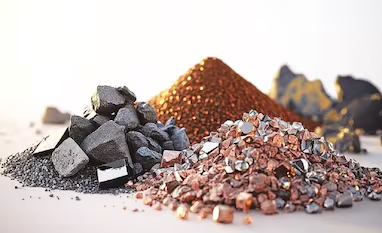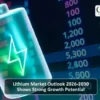$1.2 Billion Strategic Reserve Unveiled to Strengthen Supply Chain Control
The Federal Government has announced plans to establish a Critical Minerals Strategic Reserve. The initiative includes a $1.2 billion investment aimed at strengthening national resilience and securing long-term economic growth.
Prime Minister Anthony Albanese detailed the initiative during a national announcement. He said the policy responds to global uncertainties and increasing demand for rare earths and other essential resources.
“In a time of global uncertainty, Australia will be stronger and safer by developing our critical national assets to create economic opportunity and resilience,” Albanese said. “To leverage our natural resources is in our national interest.”
Voluntary Offtake Agreements to Support Market Stability
The Strategic Reserve will operate through two primary mechanisms. These include voluntary national offtake agreements and selective stockpiling of key materials.
The Federal Government will purchase agreed volumes of critical minerals from domestic projects. It will also retain options to secure additional volumes at fixed prices.
“The Strategic Reserve will mean government has the power to purchase, own and sell critical minerals found here in Australia,” Albanese said. “It will mean we can deal with trade and market disruptions from a position of strength.”
Critical Minerals Facility to Expand to $5 Billion
As part of the announcement, the existing Critical Minerals Facility will receive an additional $1 billion in funding. This brings the total facility value to $5 billion.
The expanded fund will assist early-stage projects that require capital support. These projects involve materials essential to high-tech manufacturing and energy transition technologies.
Australia holds significant reserves of minerals such as lithium, cobalt, and rare earths. These are central to clean energy systems, defence technology, and advanced electronics.
Industry Supports National Strategic Reserve
The policy has received support from major industry bodies. The Association of Mining and Exploration Companies said the move would enhance investor confidence.
CEO Warren Pearce highlighted the Reserve’s role in enabling private sector growth.
“It will provide support to the private sector and assist international investors and partners with the upfront capital costs of new projects,” Pearce said. “In the geopolitical context of today, critical minerals are more important than ever. This policy setting will help Australia leverage our position as a major critical minerals player in the global market.”
Minerals Council Calls for Regulatory Improvements
The Minerals Council of Australia welcomed the announcement. CEO Tania Constable stressed the need for streamlined investment conditions.
“We must focus on the fundamentals that will give Australia back the edge over other mining nations,” Constable said. “These changes would make it easier for companies to invest in Australia, without the need for taxpayer-funded incentives and government intervention in markets.”
Constable said long-term growth depends on clear and efficient regulatory pathways. She pointed to private investment as the key driver of industry development.
Also Read: Top 5 ASX Copper Stocks of 2025 Record Strong Gains Amid Positive Market Outlook
WA Critical Minerals Potential in Spotlight
The Chamber of Minerals and Energy Western Australia voiced strong support. CEO Rebecca Tomkinson pointed to recent trade tensions as a catalyst for investment in local resources.
“Recent trade and geopolitical disruptions present a golden opportunity for Australia to attract the significant investment required to unlock our world-class critical minerals endowment,” Tomkinson said.
Tomkinson noted the complexity of global rare earths markets. She said price instability continues to limit the commercial viability of emerging projects.
“Like other critical minerals, the market for rare earths is thin, opaque and subject to unpredictable price swings, which has acted as a major barrier to getting projects off the ground,” Tomkinson said.
She said offtake agreements could help stabilise cash flow for new ventures.
“Federal Labor’s plan to offer voluntary offtake agreements that allow producers to lock-in stable and predictable revenue may assist in bringing projects to market by enhancing their attractiveness to investors,” she said.
Australia’s Strategic Advantage in Global Markets
Australia holds some of the largest reserves of lithium, cobalt, and rare earths globally. These minerals are vital for electric vehicles, renewable energy, and defence applications. Demand is increasing as global economies move towards clean energy transitions.
The government aims to position Australia as a reliable partner in global supply chains. It also seeks to build strategic resilience by reducing reliance on overseas sources.
With $1.2 billion committed to the Strategic Reserve and expanded support through the Critical Minerals Facility, the Federal Government aims to future-proof Australia’s position.
The initiative forms part of a broader economic and national security agenda. It reflects increasing global competition for mineral supply chain control.
As demand continues to rise, Australia’s ability to supply critical minerals will shape future trade and strategic partnerships.













